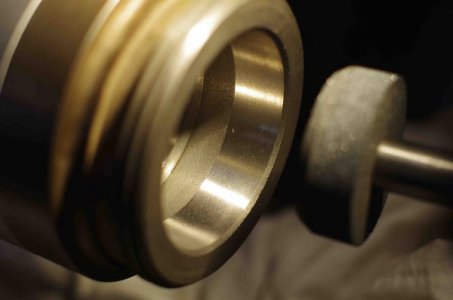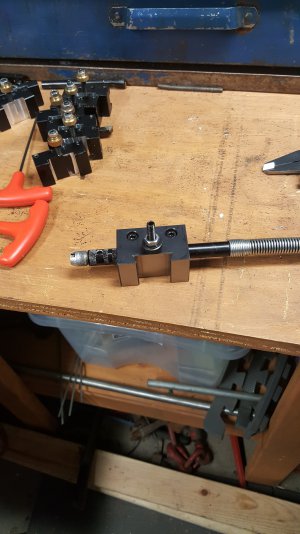-
Welcome back Guest! Did you know you can mentor other members here at H-M? If not, please check out our Relaunch of Hobby Machinist Mentoring Program!
You are using an out of date browser. It may not display this or other websites correctly.
You should upgrade or use an alternative browser.
You should upgrade or use an alternative browser.
Can't Understand What A Tool Post Grinder Is Good For?
- Thread starter great white
- Start date
F
f350ca
Forum Guest
Register Today
- Joined
- Jul 20, 2014
- Messages
- 182
I may make one though as I will have a nice 1/8 HP motor when I convert my Atlas to DC. Might be a nice project to practice on....
Agreed, nice project. But in the end with such a light-duty unit you may wish you had simply bought a Dremel Tool and the tool post adapter.
- Joined
- Mar 19, 2014
- Messages
- 2,681
Wow, what an interesting thread. So many opinions. I would like to input a few. A tool post grinder is just that, it grinds. A big difference when comparing it to the cutting action of a tool bit. Hard materials, interrupted cuts, surface finish, tolerance control to name a few are jobs for a grinder. A 1/8hp motor should be able to handle 2” diameter stones. Aluminum can be ground, but I would not do it all day, the stone will eventually load up. Frequent stone dressings (coarse) would be a top priority. IMHO a Dremel is not in the caliber of any tool post grinder, and one that is properly homemade. AND the most important of all, protect your lathe from the grinding grit/swarf. I would wrap the lathe with an easily tearable material, like newspaper. And when you are done, just to make sure, give your lathe a good cleaning. If you have or can find a tool post grinder for your shop, I would say definitely get it. When you need it, there is no substituting…Good Luck, Dave.
- Joined
- Jun 14, 2014
- Messages
- 410
I used to reface silicon covered rollers (for transfer printing) on a lathe with a TPG.
- Joined
- May 22, 2015
- Messages
- 89
I have made molds for injection molded plastic parts out of 7075 aluminum. I ground the aluminum blocks on my surface grinder using a soft, open wheel and lots of coolant. I also smeared a layer of grease all over the surface before each pass. It made a real nice flat parting line - much nicer than any flycutter. The wheel didn't load up very fast at all. The biggest problem was the magnetic chuck wasn't strong enough. 
I have also refaced silicone covered rollers with a toolpost grinder for a printer friend of mine....
I have also refaced silicone covered rollers with a toolpost grinder for a printer friend of mine....
Last edited:
Hi all,
I have read all postings in this thread, very interesting.
I agree my question doesn't apply to everyone, but none the less:
I am in the process of "restoring" a universal grinder which has a cylindrical grinding attachment. If that is operational, would there be any advantage in also having a toolpost grinder for my lathe?
(agreed, it is a nice project to build, but I still have some of those left )
)
Peter
I have read all postings in this thread, very interesting.
I agree my question doesn't apply to everyone, but none the less:
I am in the process of "restoring" a universal grinder which has a cylindrical grinding attachment. If that is operational, would there be any advantage in also having a toolpost grinder for my lathe?
(agreed, it is a nice project to build, but I still have some of those left
 )
)Peter
- Joined
- Jul 19, 2013
- Messages
- 590
A toolpost grinder should find many uses for making or re-purposing shop tooling. For example re-grinding slightly larger tooling to fit machines with obsolete tapers, like the #9 B&S on my Index vertical mill. Not much tooling around to fit. but plenty of larger tooling that can be re-ground.
- Joined
- Jul 2, 2015
- Messages
- 3
Years ago when I worked in a print shop we used a tool post grinder to sharpen the cylindrical knives used to slit the paper as it went into the printing press.




